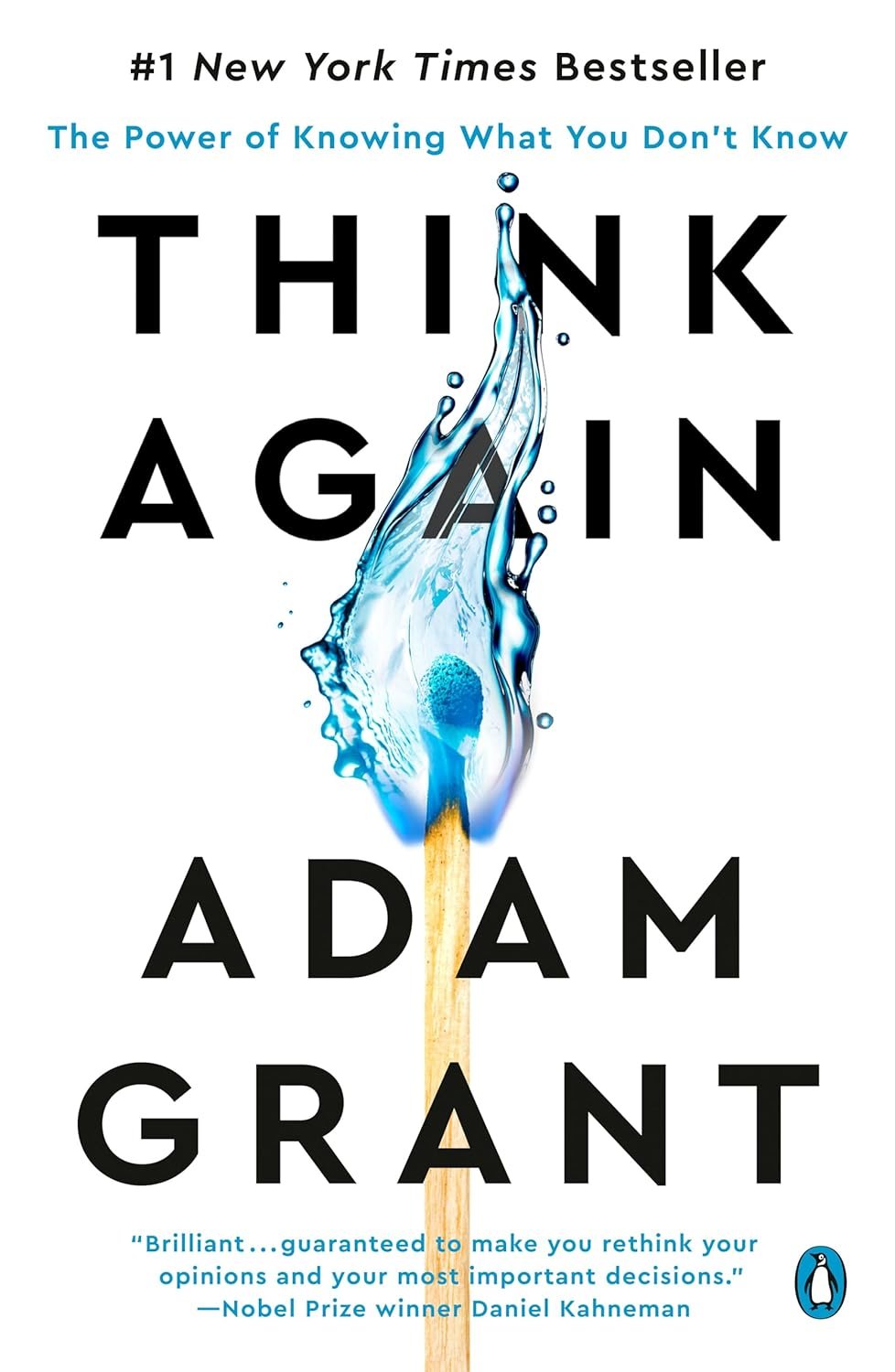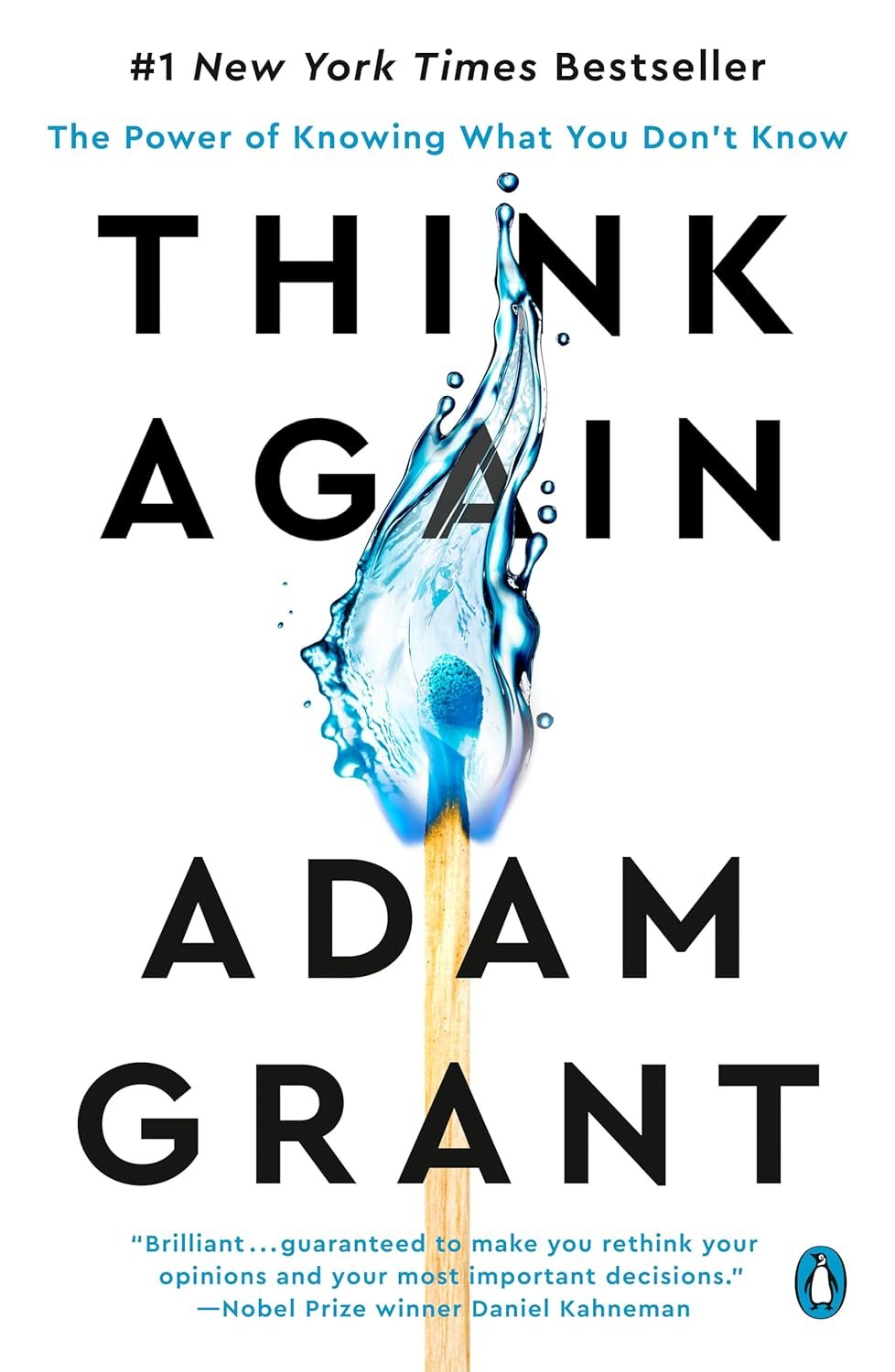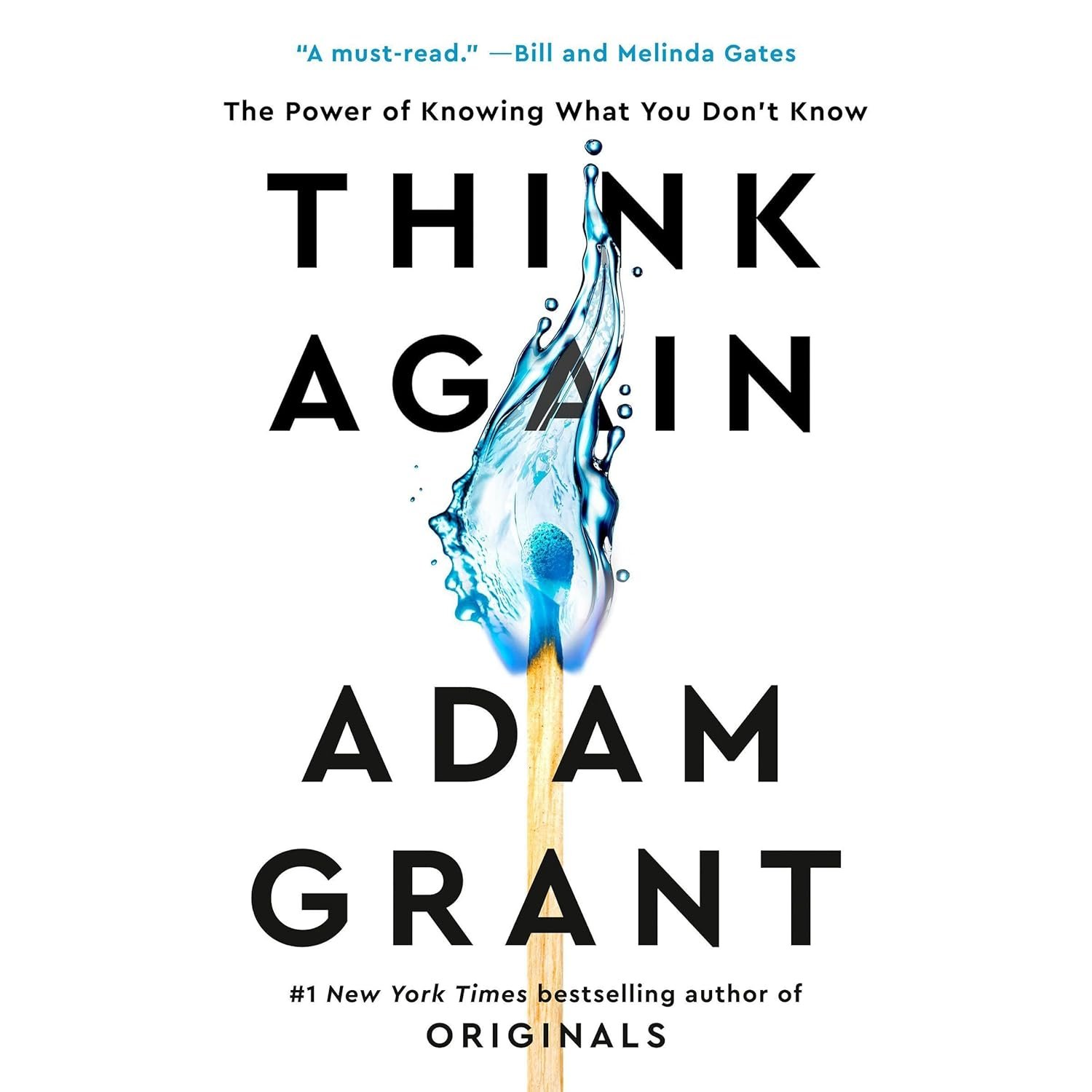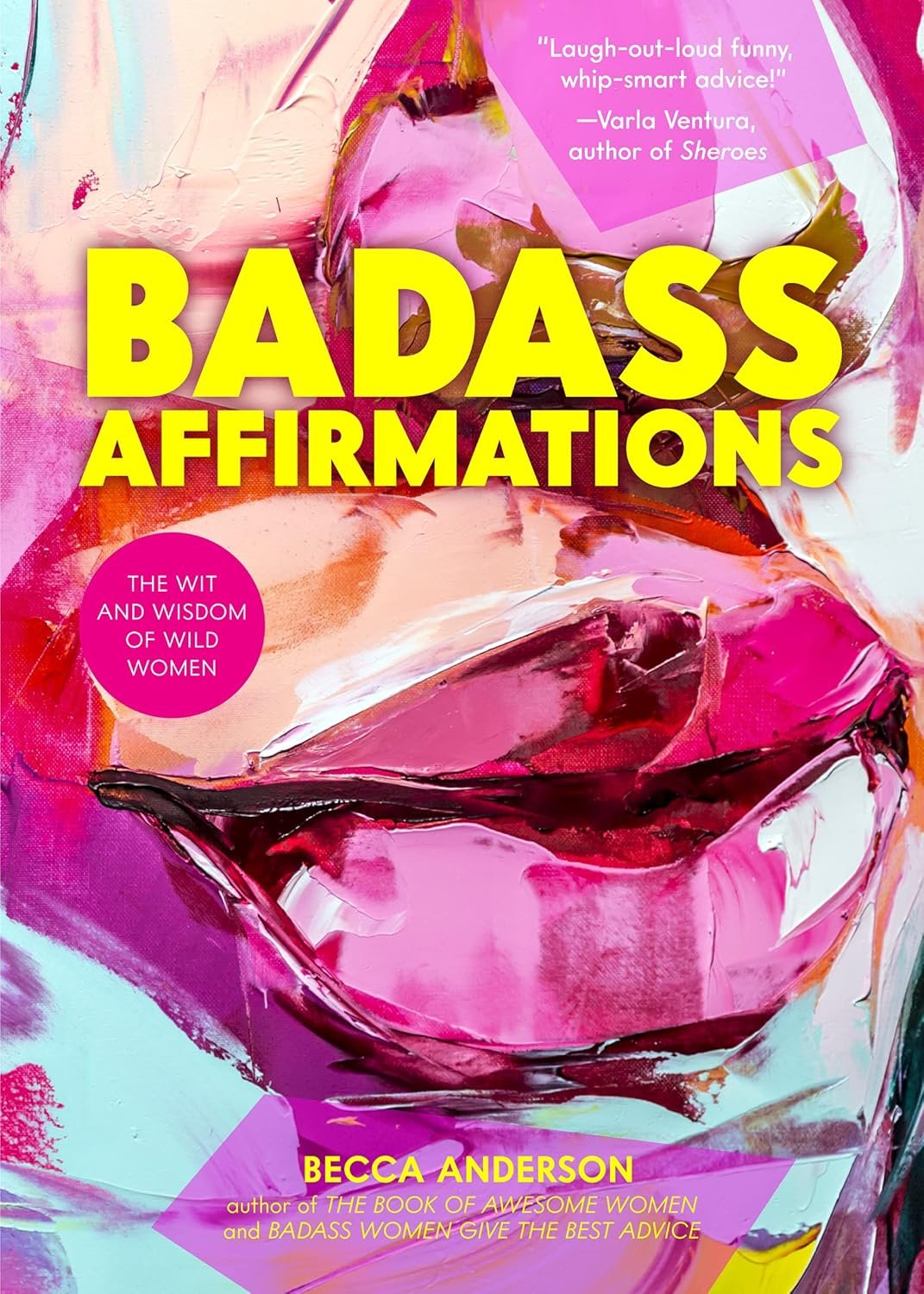The #1 New York Times bestselling author of Give and Take and Originals examines the critical art of rethinking: learning to question your opinions and open other people’s minds, which can position you for excellence at work and wisdom in life
Intelligence is usually seen as the ability to think and learn, but in a rapidly changing world, there’s another set of cognitive skills that might matter more: the ability to rethink and unlearn.
With bold ideas and rigorous evidence, Adam Grant investigates how we can embrace the joy of being wrong, harness the advantages of impostor syndrome, bring nuance into charged conversations, and build schools, workplaces, and communities of lifelong learners. Think Again reveals that we don’t have to believe all our thoughts or internalize all our emotions. It’s an invitation to let go of views that are no longer serving us well and prize mental flexibility, humility, and curiosity over consistency.
From the Publisher



Publisher : Penguin Books
Publication date : December 26, 2023
Language : English
Print length : 320 pages
ISBN-10 : 1984878123
ISBN-13 : 978-1984878120
Item Weight : 2.31 pounds
Dimensions : 5.4 x 0.7 x 8.4 inches









Ryan Boissonneault –
How to Beat the Overconfidence Effect in Yourself and Others
In 1933, the philosopher Bertrand Russell wrote that âthe fundamental cause of the trouble is that in the modern world the stupid are cocksure while the intelligent are full of doubt.â While this is just as true today as it was in the early twentieth-century, the problem actually runs deeper; almost everyone recognizes arrogance and overconfidence in othersâbut never in themselves.Since the time of Russell, whatâs become known as the Dunning-Kruger Effect has been experimentally validated. Research showsâand personal experience confirmsâthat those who are the least knowledgeable in a subject tend to be the ones who overestimate their own knowledge and abilities, while those that are full of doubt know enough about the topic to better gauge the extent of their ignorance.And so the telltale sign of a lack of knowledge is, paradoxically, arrogance and overconfidence, whereas in those with actual expertise you often see the opposite: humility, doubt, and open-mindedness.Far more people fall on the side of overconfidence. This is due, at least in part, to widespread access to the internet, where people can quickly read articles and watch videos (of varying quality and credibility) on any conceivable topic, creating the impression that one has attained deep knowledge in a subject when only a very superficial understanding has been gained.Overcoming this unfortunate state of affairs is the subject of organizational psychologist Adam Grantâs latest book, Think Again, which seeks to show us how to overcome our own unjustified overconfidence by developing the habits of mind that force us to challenge our own beliefs and, when necessary, to change them.Grant begins by telling us that when we think and talk, we often slip into the mindset of three distinct professions: preachers, prosecutors, and politicians. We become preachers when the unwarranted strength of our convictions compels us to convert others to our way of thinking; prosecutors when our sole aim is to discredit the beliefs of others; and politicians when we seek to win favors from our chosen constituency.What all of these mindsets have in common is the assumption that our beliefs are infallible, and that no one could possibly have anything to teach us. Trapped in the prison cell of our own dogma, we donât set out to learn anything or update our own beliefs; our job is simply to convert others to our way of thinking because, of course, we are right.These habits of mental imprisonment can happen to anyone at any level of knowledge or experience, and intelligence itself has actually been shown at times to be a disadvantage, as those with high IQs have the most difficulty updating their beliefs. As Dunning himself said, âThe first rule of the Dunning-Kruger club is you donât know youâre a member of the Dunning-Kruger club.â You may think all of your beliefs are correct (otherwise you wouldnât hold them), but there is little doubt that at least some (probably many) of them are false or oversimplified. If your mind remains closed, youâll never discover which of these beliefs require updating.The key question, then, is this: If most of us are unaware of the extent of our own ignorance, how can we hope to overcome our own resistance to change?The first step, as Grant recommends, is to detach your sense of self from any specific beliefs. If you identify with a specific set of fixed core beliefs, you will be far less likely to change your mind in the face of new evidence or better reasoning.Grant recommends instead to ground your sense of self in mental flexibility, taking pride in the fact that youâre willing to change your mind and update your beliefs. To achieve this, you must consider all of your beliefs to be provisional hypotheses and then seek to disprove them, in the process becoming more knowledgeable by being wrong more often. Using this approach, you will have discovered the ideal mindset for personal development and learningânot the mindset of a preacher, prosecutor, or politician, but the mindset of a scientist.The scientist, Grant tells us, has one overarching concern: the truth. The individual that adopts a scientific mindset will be equally motivated to challenge their own beliefs as the beliefs of others, testing hypotheses against the evidence and continually updating their beliefs in the process.Of course, as Grant points out, being an actual practicing scientist does not guarantee the adoption of this mindset. There are plenty of dogmatic scientists that donât abide by the principles of their own training. The scientific mindset is not, as Grant is describing it, the mindset adopted by scientists necessarily, but rather the ideal mindset that follows the principles of science as an open-ended pursuit of knowledge that is constantly updated in the face of new evidence.In one interesting study described by Grant (the book is filled with fascinating examples and studies of a similar sort), two groups of entrepreneurs were provided training. One group was taught the principles of scientific thinking while the control group was not. The researchers found that the scientific-thinking group âbrought in revenue twice as fastâand attracted customers sooner, too.â As Grant wrote:âThe entrepreneurs in the control group tended to stay wedded to their original strategies and products. It was too easy to preach the virtues of their past decisions, prosecute the vices of alternative positions, and politick by catering to advisers who favored the existing direction. The entrepreneurs who had been taught to think like scientists, in contrast, pivoted more than twice as often.âIndividuals that enjoy the prospect of being wrongâand so expand their knowledge more oftenâtend to be more successful and tend to hold more accurate, nuanced beliefs. Itâs not that they lack confidence, itâs that their confidence is of a different nature. Flexible-minded individuals have confidence in their ability to learn and to unlearn beliefs that are outdated or are no longer serving them well. Their confidence lies in their ability to change and to adapt rather than in strength of their convictions concerning any single set of beliefs. As Nobel Prize-winning psychologist Daniel Kahneman put it, âBeing wrong is the only way I feel sure Iâve learned anything.âThere is definitely a line to walk, and the reader may wonder just how far they should take this advice. To constantly question every one of your beliefs would result in paralyzing doubt. Sometimes, it is the strength of our convictions that give us the energy and perseverance to pursue and accomplish our goals. So this is surely a balancing act, and while we all have to find the sweet spot between timidity and arrogance, conviction and doubt, there is little question that too many of us tend toward the extreme of overconfidence.After showing us how to become better rethinkers ourselves, in the second part of the book we learn how to open other peopleâs minds. Grant shows us how world-class debaters win debates, how a black musician talked white supremicists out of their bigoted views, and how doctors persuaded anti-vaxxers to get their children immunized.In every case, we learn the same lesson in the art of persuasion: to change someone elseâs mind, you have to help them find their own internal motivation to change.This is not easy. The mindsets we typically slip into tend to have the opposite effect. Act as a preacher, and people will resist being told what to think (even if the facts are on your side). Act as a prosecutor, and people will resent your condescension and will become further entrenched in their original views. Act as a politician, and youâre just saying what you think people want to hear.None of these approaches are effective as tools of persuasion. It turns out that your best bet is to adopt, once again, the mindset of a scientistâand to try to get others to do the same. This will transform disagreements from battles to be won and lost into a collaborative pursuit of the truth.The most skilled negotiators, debaters, and persuaders all use similar tactics: they first find common ground and points of agreement, ask more questions to get the other person thinking deeper, present a limited number of stronger points, and introduce complexity into the topic to move the personâs thinking away from black-and-white and into shades of gray.It turns out that complexifying the issue is always key. Most people exhibit what psychologists call binary bias, or the âbasic human tendency to seek clarity and closure by simplifying a complex continuum into two categories.â If you can show peopleâthrough the use of skillful questioningâthat the topic they think they understand deeply (Dunning-Kruger Effect) is actually far more complex than they originally thought with more than two distinct positions, then you can plant the seeds of doubt that eventually lead to real change.One example Grant uses is climate change. We tend to think that people fall into one of two categoriesâclimate-deniers or alarmistsâwhen in fact there are six distinct positions people can take from dismissive, doubtful, or disengaged to cautious, concerned, or alarmedâwith shades of nuance in between. Itâs often the recognition of this complexity that can get people talking and engaged in productive debate.In the final part of the book, Grant shows us how to use the skills of rethinking to engage in more productive political debates, to become better teachers, and to create more innovative cultures at work. Grant provides a host of compelling examples, but my favorite is the middle-school history teacher who gets her students to think like scientists by rewriting textbook chapters that failed to cover important historical events in sufficient depth. Her students pick a time period and topic that interests them and then, through independent research, rewrite the textbook chapter, in the process cultivating the skill to always question what they read. This is a far better approach than simply delivering a lecture and forcing students to regurgitate the information on a test.Bertrand Russell was once asked in an interview if he was willing to die for any of his beliefs. His response was this: âOf course not. After all, I may be wrong.âItâs a shame that most people adopt the opposite attitude, and Grantâs latest book will go a long way to remedying this. Think Again is a timely exploration of the importance of humility and the capacity to rethink your own positions while helping others do the same.But in the spirit of the bookâand to âcomplexifyâ the topicâitâs worth considering when displaying doubt and humility might actually backfire. Grant wonders this himself, and points out, for example, that displays of doubt and humility have been shown to have negative effects in the workplace in those who have not already established their competence. It can also be less effective when delivering a presentation to an already sympathetic audience. Does Grant downplay the frequency of these types of situations?Another area where excessive doubt and humility might backfire is an area that Grant fails to consider in much depth at all: arguing with bad faith actors. When discussing politics, Grant seems to assume that in most cases both sides are equally motivated by the truth, and that each side has simply failed to understand the complexity of the topic or the merits of the other side.But we know that this is not always the case. In politics, people have a host of motives when arguing that sometimes have very little to do with the truth: the desire for power, money, influence, and sometimes simply the desire to offend and get a rise out of people. Grant does not cover how to handle these situationsâor how to identify themâand it is highly unlikely that the tactics of the book will work in these situations.Additionally, it seems that the masses respond better to confidence when electing political representatives, because we know that Trump was not elected based on his knowledge or competenceâand certainly not on his humility.When dealing with bad faith actors, perhaps a good strategy would be to start with a simple question, one Grant mentions in the book: âWhat evidence would change your mind?â If the answer is ânothing,â then itâs probably best to walk away. Either way, a chapter or section on bad faith actors and the questions you can ask to identify them would have been a welcome addition to the book.But of course, this book is not the final word on the topic, and Grant wouldnât want it to be. As we gain better evidence and more experience, itâs our responsibility to continually rethink and update our beliefs. As Russell said, âIf youâre certain of anything, youâre certainly wrong, because nothing deserves absolute certainty.â
Wally Bock –
Adam Grant’s best book yet for business leaders
There are two powerful reasons to read this book. One: Youâll learn a lot. Two: This book will be mentioned in articles and discussions. It will make the short list of books every manager should read. I bought Think Again: The Power of Knowing What You Donât Know by Adam Grant because Iâve learned a lot from his books, blogs, and articles. I expected the same level of lucid writing and penetrating insight that I got from Originals and Give and Take. For me, this was the best book yet. Think Again is the best book Grant has written for business leaders. That VUCA world we keep hearing about requires flexibility and unlearning. Most of the books Iâve seen on the kind of learning you need for todayâs world focus on corporate cultures, on creating âlearning institutions.â Think Again is different. Think Again is about the learning culture between your ears. Hereâs how Grant states the purpose of the book. âThis book is an invitation to let go of knowledge and opinions that are no longer serving you well, and to anchor your sense of self in flexibility rather than consistency. If you can master the art of rethinking, I believe youâll be better positioned for success at work and happiness in life. Thinking again can help you generate new solutions to old problems and revisit old solutions to new problems. Itâs a path to learning more from the people around you and living with fewer regrets. A hallmark of wisdom is knowing when itâs time to abandon some of your most treasured toolsâand some of the most cherished parts of your identity.âThe first section of the book is about opening your mind. Itâs about what âthinking againâ really means. The second part of the book looks at ways to encourage others to think again or to think along with you. The third section is about creating communities of lifelong learners. A key to getting the most from this book is the different mindsets that Philip Tetlock discovered. Hereâs Grantâs brief description from Think Again.âTwo decades ago my colleague Phil Tetlock discovered something peculiar. As we think and talk, we often slip into the mindsets of three different professions: preachers, prosecutors, and politicians. In each of these modes, we take on a particular identity and use a distinct set of tools. We go into preacher mode when our sacred beliefs are in jeopardy: we deliver sermons to protect and promote our ideals. We enter prosecutor mode when we recognize flaws in other peopleâs reasoning: we marshal arguments to prove them wrong and win our case. We shift into politician mode when weâre seeking to win over an audience: we campaign and lobby for the approval of our constituents. The risk is that we become so wrapped up in preaching that weâre right, prosecuting others who are wrong, and politicking for support that we donât bother to rethink our own views.âGrant uses Tetlockâs terms for the different mindsets. I found digging around on the web and in the scholarly literature for more on the mindsets helped me squeeze even more value from this book. This is not a book where you can skip around and get much value. The description of thinking in the first section sets up later lessons and insights. The second section builds on the first and applies the lessons to debate and persuasion. The third section builds on the first two. It extends the basic mindset idea to groups. Suggestion. As a warmup for Think Again, take a minute to read a Farnam Street blog post: “Jeff Bezos on Why People that Are Often Right Change Their Minds Often.”In A NutshellThink Again is an excellent book that will give you techniques you can use to think more effectively at work and everywhere else. Youâll get more from the book if you do a little bit of homework. Learn about Tetlockâs mindsets and the general idea of changing your mind as a way of thinking.Â
Magdalena Ruyú –
Loved the book, another hit by Adam. Makes you humble and eager to learn more.
Margarete –
It is amazing book , concept and it is really well written-The art of question what we already know is intriguing and also exiting
Tommaso M. –
da leggere!
Joshua –
Love how this books makes us aware of our own self-serving bias. If you are planning to find out how to lead better, interact better or just learn better, then this is the book for you
Sudhakar kadiyala –
If we ask any person in the world to look back into the past & question if they have any regrets of having not done,or doing a thing wrongly,or missed opportunities of better growth in their life and so on, then it’s no surprise, if we hear almost 100% of the people having regretting the way they did or felt that,if only they have put some more thought and done differently.They wished that they should have paused for a moment or for some time,to think differently or have done in a better way.”Think Again” by Adam Grant is a book about taking time to “Rethink”..He says that or rather puts his point of view in front of us in a scientific manner telling us why “Rethinking ” is necessary.The writer very vividly categorized our reactions or thinking in four differnt ways i.e preaching, prosecuting, politicking and viewing scientifically.With his rich experience as an organizational psychalogist at Wharton,extensive research,quoting examples of the notable people who failed miserably by not rethinking at the right time and the ones who succeeded extensively by constantly rethinking,has put forth his sincere views in the book with an intent to bring the readers closer to ‘reasoning and more reasoning,’ and not to miss the chances of “Rethinking” on a day to day basis.To be honest, for the first time,I felt that as to why I should write a review at all(as usually I do after reading a book)? Perhaps it may be because I wanted to satisfy my ego, or I wish to say something about the book like a few of the other readers do after reading a book, to feel good.Well I am not sure,but here, I am writing this review feeling happy,though to write a review on a book of this kind is far different than writing on a fictional one. I like to say that here is a book that should be read by every reader who holds interest in reading, not to promote Adam Grant but for the feel good factor for themselves and about their surroundings.Reading this book,we realize that we spend days,months,years and perhaps even decades in orthodox thinking,blind beliefs and unproductive living based on which our actions,discriminations,accusations,overthinking, jugements etc depend, without a thought or concern for the actual facts or truth,bringing misery to ourselves as well as to the people around us.We also understand that no product, experience, event etc can be considered as an ideal or ultimate and that there is always a room for improvement and the best way is always to act and think scientifically.The mention of famous personalities and how they were able to remain at the top for long, while others couldn’t do so, was well illustrated with the examples like that of ‘ Mike Lazaridis and Black Berry(mobile phone)’,the forcasting & predictions of ‘Jeane Pierre vs Kjirste Morrell,the humbling British physicist Andrew Lyne(admiiting his wrong in front of a large audience),the success story of Wright brothers, Brad Bird and his failures before he won Oscar awards,the debates between Harish Natarajan vs Debra, Daryl Davis the black piano player vs a white supermacist,the innovative educator Ron Berger (*Even I wished that I should have been a student of him) and many more such real life stories of rise and fall makes the book intresting and the reading authentic.After reading the book I could find a few of the complexities with in me too which I was holding for long and realize that I too am happy for being wrong as it means that, I have come a little closer to being right.This is a book with most page markers that I have ever read.